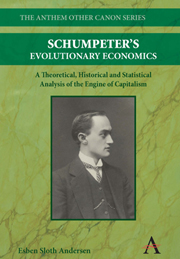 Schumpeter's Evolutionary Economics
Schumpeter's Evolutionary Economics Book contents
- Frontmatter
- Contents
- List of Figures
- List of Tables
- Preface
- Acknowledgements
- Abbreviations
- 1 Introduction
- I Equilibrium Economics and Evolutionary Economics
- II The Evolutionary Trilogy
- 6 Approaching the Evolutionary Trilogy
- 7 The Capitalist Engine and Socio-Political Evolution
- 8 Waveform Economic Evolution and Business Cycles
- 9 The Basic Mechanisms of Economic Evolution
- III Works in Progress
- Appendices
- Schumpeter's Works
- Other References
- Index of Schumpeter's Works
- Index of Persons
6 - Approaching the Evolutionary Trilogy
from II - The Evolutionary Trilogy
Published online by Cambridge University Press: 05 March 2012
- Frontmatter
- Contents
- List of Figures
- List of Tables
- Preface
- Acknowledgements
- Abbreviations
- 1 Introduction
- I Equilibrium Economics and Evolutionary Economics
- II The Evolutionary Trilogy
- 6 Approaching the Evolutionary Trilogy
- 7 The Capitalist Engine and Socio-Political Evolution
- 8 Waveform Economic Evolution and Business Cycles
- 9 The Basic Mechanisms of Economic Evolution
- III Works in Progress
- Appendices
- Schumpeter's Works
- Other References
- Index of Schumpeter's Works
- Index of Persons
Summary
According to the Schumpeter's theory of scientific creativity, the initial “period of sacred fertility” produces the fundamental vision and the fundamental results that are “subsequently worked out” (S1921, 87). He also suggested that “the roots of great scientific achievements, especially those of a theoretical nature, predominantly lie in the twenties of their author's life” (DBA, 16–17; omitted in S1914c). In Schumpeter's case, the especially fertile years covered the period 1903–13. During these years, he had not only produced Wesen and Entwicklung I but also developed many related ideas. The subsequent development of his early results primarily took place after he had resumed academic life in 1925. In the intermediate years, he had been involved in politics and private banking—including his short and rather unsuccessful service as the Austrian Minister of Finance (see Appendix A). Now he established himself as an internationally recognised professor of economics—first at the University of Bonn in Germany from 1925 to 1932; and then at Harvard University from 1932 until his death in 1950. At the University Bonn he radically revised Theorie der wirtschaftlichen Entwicklung and prepared to extend its analyses of the evolutionary functions of money and business cycles. Nevertheless, the three books from which his evolutionary economics and evolutionary sociology are today primarily known were published during his Harvard period. These books are The Theory of Economic Development from 1934; Business Cycles from 1939; and Capitalism, Socialism and Democracy from 1942.
- Type
- Chapter
- Information
- Schumpeter's Evolutionary EconomicsA Theoretical, Historical and Statistical Analysis of the Engine of Capitalism, pp. 137 - 154Publisher: Anthem PressPrint publication year: 2009


